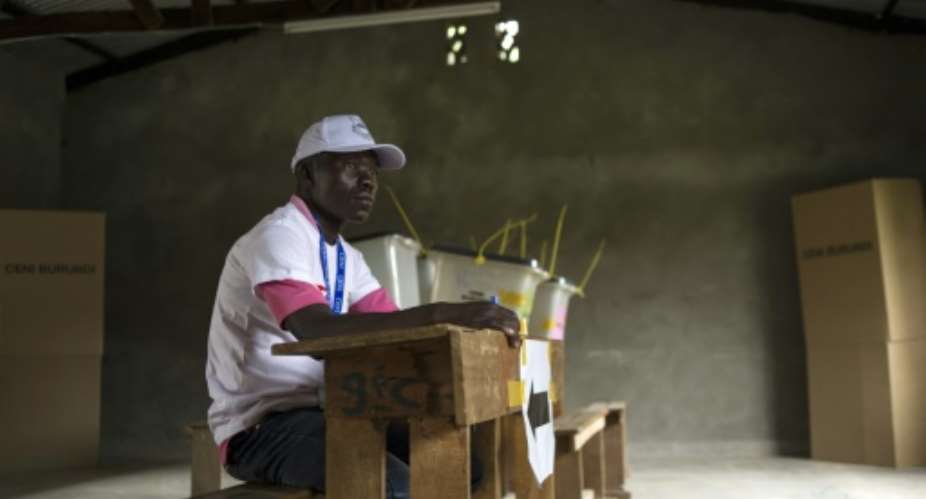Bujumbura (Burundi) (AFP) - Sitting in a quiet polling station in Burundi's capital Bujumbura, the four election officials have little better to do than listen to the radio.
Voters are shunning the ballot here in the key opposition Nyakabiga district, driven both by a fear of violence following weeks of unrest and a string of recent grenade attacks, as well as heeding a boycott call by the opposition.
But even in the strongholds of the ruling party, queues of voters appeared smaller than the 2010 polls, elections the opposition also boycotted.
"In one hour, we've had two people," said Jean De Dieu Kubona, who is in charge of one Nyakabiga polling stations, which has a total of 354 registered voters.
Outside, the street is quiet. Four party agents sit bored -- two from the ruling CNDD-FDD and two from its ally, the Uprona party.
"People are afraid to come to vote," said Kubona. "They are also a bit lost because we changed the site at the last minute," in accordance with an electoral commission efforts to move polling stations away from the protest hotspots.
Kubona said he hoped more voters will come later once they see their "safety is ensured".
The troubled central African nation has been in crisis since late April over President Pierre Nkurunziza's controversial bid to stand for a third consecutive five-year term, a move branded by opponents as unconstitutional and a violation of a peace deal that ended 13 years of civil war in 2006.
- Quiet even in government areas -
Around 70 people have been killed in weeks of opposition protests that have been brutally suppressed, triggering an exodus of around 127,000 people into neighbouring countries.
So voters are wary. Overnight here, a series of grenades were hurled and heavy gunfire reported, meaning voting due to open at dawn opened started three hours late.
Those who do vote are nervous: in another polling station nearby, a lady pleads with a photographer not to take her picture.
"I'm afraid that people in my neighbourhood could harm me, because the majority of people in Nyakabiga said they would boycott the elections," she said.
People are watchful. Rocks have been placed at the entrance to the neighbourhood to block traffic, and young men watch those who come and go.
"The elections... are condemned by the entire international community, it is an electoral robbery we cannot accept," said one man at a street barricade.
Tensions are high, and residents say they have been threatened not to vote.
In response, the electoral commission shifted many stations outside flashpoint areas, but that has added to confusion for some, while doing little to encourage people to vote.
The picture is different in pro-government areas.
In Bujumbura's Kamenge district, a stronghold of Nkurunziza's CNDD-FDD, polling station chief Dismas Nduwayezu proudly said that 52 out of the 455 registered voters had cast their ballots within the first two hours.
But even here, participation seems low. Outside the station, only 10 people waited to vote, while dozens of police officers stood guard, searching everyone who entered.
"I came to vote because it's my right to vote, it is also a duty for every citizen," said Ezechiel, a 35-year-old ruling party supporter.
Also waiting to vote was Salima Mundanikure, in her fifties, who also said voting was an obligation.
"I hope that people will come later in the day, people need to understand that it is a duty," she said.





 Meta releases new version of conversational AI across its platforms
Meta releases new version of conversational AI across its platforms
 Cape Town named Africa’s Best Airport 2024 by Skytrax
Cape Town named Africa’s Best Airport 2024 by Skytrax
 Bono East: Four injured after hearse transporting corpse crashes into a truck
Bono East: Four injured after hearse transporting corpse crashes into a truck
 ‘Be courageous, find your voice to defend our democracy’ — Sam Jonah urges journ...
‘Be courageous, find your voice to defend our democracy’ — Sam Jonah urges journ...
 Exodus of doctors, nurses and teachers have worsened because of unserious Akufo-...
Exodus of doctors, nurses and teachers have worsened because of unserious Akufo-...
 2024 election: Avoid insults, cutting down people in search of power – National ...
2024 election: Avoid insults, cutting down people in search of power – National ...
 ‘You passed through the back door but congratulations’ — Atubiga on Prof Jane Na...
‘You passed through the back door but congratulations’ — Atubiga on Prof Jane Na...
 Government’s $21.1 billion added to the stock of public debt has been spent judi...
Government’s $21.1 billion added to the stock of public debt has been spent judi...
 Akufo-Addo will soon relocate Mahama’s Ridge Hospital to Kumasi for recommission...
Akufo-Addo will soon relocate Mahama’s Ridge Hospital to Kumasi for recommission...
 We must not compromise on our defence of national interest; this is the time to ...
We must not compromise on our defence of national interest; this is the time to ...
